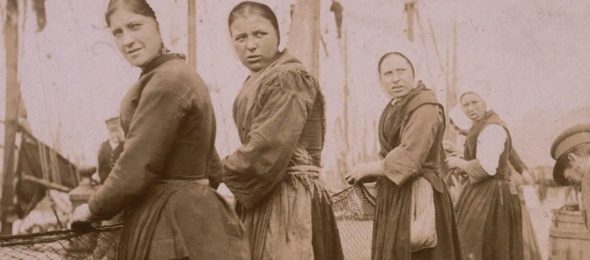Call for Papers: “Women of the Waterfront: Gendering ports, careers, relations and (everyday) life trajectories in modern times”
Deadline: September 15, 2023
Organizers: NextGenerationEU Project ‘Ondine’ (Dep. History, Humanities and Society – Tor Vergata University of Rome) in collaboration with Istituto nazionale Ferruccio Parri, Fondazione ISEC and Fondazione Gramsci onlus Roma
Dates and location: Rome, December 6-7, 2023 at Casa Internazionale delle Donne and remotely
Languages of communication: English and Italian
The workshop aims to highlight the modalities through which gender (dis)affiliation shaped or influenced labor and/or business cultures, the relations between sexes, classes, generations, nationalities/‘races’ or other kinds of belonging, and, finally, everyday life patterns in (imperial/colonial) European port/emporium cities in Modern times (19th–20th centuries).
As Catterall and Campbell (2012) have suggested, ports can be acknowledged as ‘points of articulation’ between the various axes of an individual’s identity (e.g., class, sex, ‘race’), different contexts of belonging (e.g., community, ethnicity, corporate group, the State) and different normative frameworks (e.g., formal authority, capitalism, religion). In that scenario, gender appears as a particularly effective intersectional analysis tool for that specific environment since it allows the inquiry to transcend the limits of a normative, identity and belonging nature.
When uttering the word ‘port,’ the first image that comes to mind, after ships and docks, is that of a sailor, a merchant, a traveller/tourist or, finally, a migrant. In the collective imaginary, all these subjects are men, and, in the same way, city ports are usually gendered as masculine environments. Nevertheless, considering that local men – in their turn sailors, merchants, travellers or migrants – were often and for long periods away from home, the urban-maritime contexts were actually spaces that allowed women, especially of the lower classes, noticeable economic, social, relational and cultural agency. In Modern times, for women, work, career and entrepreneurial opportunities in a port city included roles such as moneylender, maid, fishmonger, innkeeper, smuggler, seafarer, journey[wo]man – also at the docks or shipyards –, sex workers, and processors or retailers of colonial consumer goods (e.g., tobacco, coffee, chocolate). However, ports’ women were also traders, shipowners, travellers/tourists, explorers, and adventurers too. In this regard, it is essential to understand that women also chose to leave their home communities to pursue novel labour, social and economic horizons, often in other city ports and frequently overseas. In doing so, those migrant female workers/entrepreneurs were also able to reconfigure and reframe gender relations and roles outside the mainstream and dominant socio-cultural norms.
Finally, it is necessary to emphasise that the intricate intersection between the urban-maritime environment and gender can also adopt the contours of the ‘crime story’, with its multifaceted sexual, public health, moralistic, repressive and normative entanglements (Maynard, 1993; Milne, 2016; Richards, 2022; Thornberry, 2016).
We would particularly welcome:
- proposals that deal with women’s socio-economic activities in imperial/colonial European city-ports and/or in a class-cross perspective;
- proposals from scholars belonging to disciplines other than history (e.g., anthropology, sociology, economics, migration and queer studies).
The workshop proceedings in English and Italian will be published in a collective volume edited by Erica Mezzoli for the Vita Activa (Trieste, Italy) publisher.
Please send your 20-minute-presentation proposal to Erica Mezzoli by September 15, 2023. The proposal should include:
– max 300-word abstract in English;
– max 250-word bio profile in English with affiliation, position and contact information.
The workshop is organised in the framework of the NextGenerationEU Project ‘Ondine. Women’s Labour and Everyday Life on the Upper and Eastern Adriatic Waterfronts, mid-19th century–mid-20th century’ (Funded by EU; CUP E53C22002420001) hosted by the Department of History, Humanities and Society of the Tor Vergata University of Rome.








